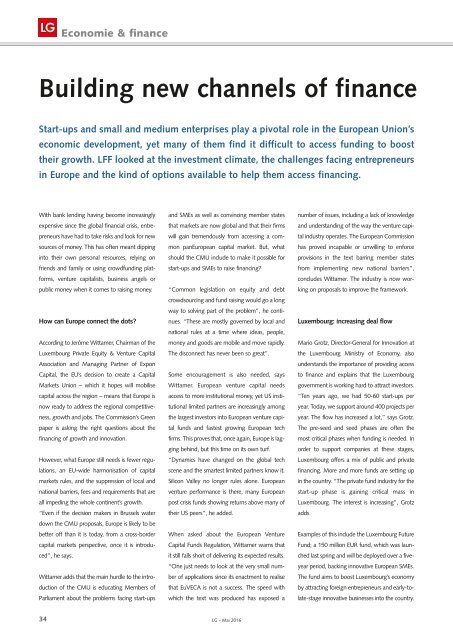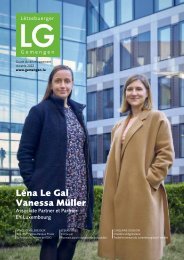LG 187
Create successful ePaper yourself
Turn your PDF publications into a flip-book with our unique Google optimized e-Paper software.
Economie & finance<br />
Building new channels of finance<br />
Start-ups and small and medium enterprises play a pivotal role in the European Union’s<br />
economic development, yet many of them find it difficult to access funding to boost<br />
their growth. LFF looked at the investment climate, the challenges facing entrepreneurs<br />
in Europe and the kind of options available to help them access financing.<br />
With bank lending having become increasingly<br />
expensive since the global financial crisis, entrepreneurs<br />
have had to take risks and look for new<br />
sources of money. This has often meant dipping<br />
into their own personal resources, relying on<br />
friends and family or using crowdfunding platforms,<br />
venture capitalists, business angels or<br />
public money when it comes to raising money.<br />
How can Europe connect the dots?<br />
According to Jerôme Wittamer, Chairman of the<br />
Luxembourg Private Equity & Venture Capital<br />
Association and Managing Partner of Expon<br />
Capital, the EU’s decision to create a Capital<br />
Markets Union – which it hopes will mobilise<br />
capital across the region – means that Europe is<br />
now ready to address the regional competitiveness,<br />
growth and jobs. The Commission’sGreen<br />
paper is asking the right questions about the<br />
financing of growth and innovation.<br />
However, what Europe still needs is fewer regulations,<br />
an EU-wide harmonisation of capital<br />
markets rules, and the suppression of local and<br />
national barriers, fees and requirements that are<br />
all impeding the whole continent’sgrowth.<br />
“Even if the decision makers in Brussels water<br />
down the CMU proposals, Europe is likely to be<br />
better off than it is today, from a cross-border<br />
capital markets perspective, once it is introduced”,<br />
he says.<br />
Wittamer adds that the main hurdle to the introduction<br />
of the CMU is educating Members of<br />
Parliament about the problems facing start-ups<br />
and SMEs as well as convincing member states<br />
that markets are now global and that their firms<br />
will gain tremendously from accessing a common<br />
panEuropean capital market. But, what<br />
should the CMU include to make it possible for<br />
start-ups and SMEs to raise financing?<br />
“Common legislation on equity and debt<br />
crowdsourcing and fund raising would go a long<br />
way to solving part of the problem”, he continues.<br />
“These are mostly governed by local and<br />
national rules at a time where ideas, people,<br />
money and goods are mobile and move rapidly.<br />
The disconnect has never been so great”.<br />
Some encouragement is also needed, says<br />
Wittamer. European venture capital needs<br />
access to moreinstitutional money,yet US institutional<br />
limited partners are increasingly among<br />
the largest investors into European venture capital<br />
funds and fastest growing European tech<br />
firms. This proves that, once again, Europe is lagging<br />
behind, but this time on its own turf.<br />
“Dynamics have changed on the global tech<br />
scene and the smartest limited partners know it.<br />
Silicon Valley no longer rules alone. European<br />
venture performance is there, many European<br />
post crisis funds showing returns above many of<br />
their US peers”, he added.<br />
When asked about the European Venture<br />
Capital Funds Regulation, Wittamer warns that<br />
it still falls shortof delivering its expected results.<br />
“One just needs to look at the very small number<br />
of applications since its enactment to realise<br />
that EuVECA is not a success. The speed with<br />
which the text was produced has exposed a<br />
number of issues, including a lack of knowledge<br />
and understanding of the way the venture capital<br />
industry operates. The European Commission<br />
has proved incapable or unwilling to enforce<br />
provisions in the text barring member states<br />
from implementing new national barriers”,<br />
concludes Wittamer. The industry is now working<br />
on proposals to improve the framework.<br />
Luxembourg: increasing deal flow<br />
Mario Grotz, Director-General for Innovation at<br />
the Luxembourg Ministry of Economy, also<br />
understands the importance of providing access<br />
to finance and explains that the Luxembourg<br />
government is working hard to attract investors.<br />
“Ten years ago, we had 50-60 start-ups per<br />
year.Today, we support around 400 projects per<br />
year. The flow has increased a lot,” says Grotz.<br />
The pre-seed and seed phases are often the<br />
most critical phases when funding is needed. In<br />
order to support companies at these stages,<br />
Luxembourg offers a mix of public and private<br />
financing. More and more funds are setting up<br />
in the country. “The private fund industry for the<br />
start-up phase is gaining critical mass in<br />
Luxembourg. The interest is increasing”, Grotz<br />
adds.<br />
Examples of this include the LuxembourgFuture<br />
Fund; a 150 million EUR fund, which was launched<br />
last spring and will be deployed over a fiveyear<br />
period, backing innovative European SMEs.<br />
The fund aims to boost Luxembourg’s economy<br />
by attracting foreign entrepreneurs and early-tolate-stage<br />
innovative businesses into the country.<br />
34<br />
<strong>LG</strong> - Mai 2016


















